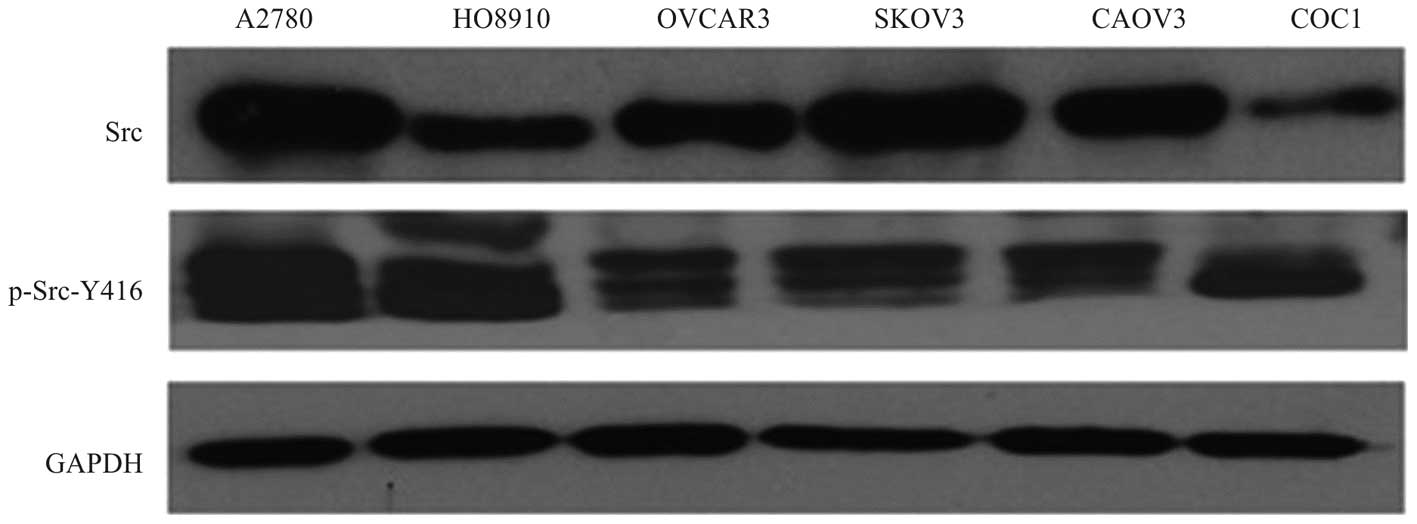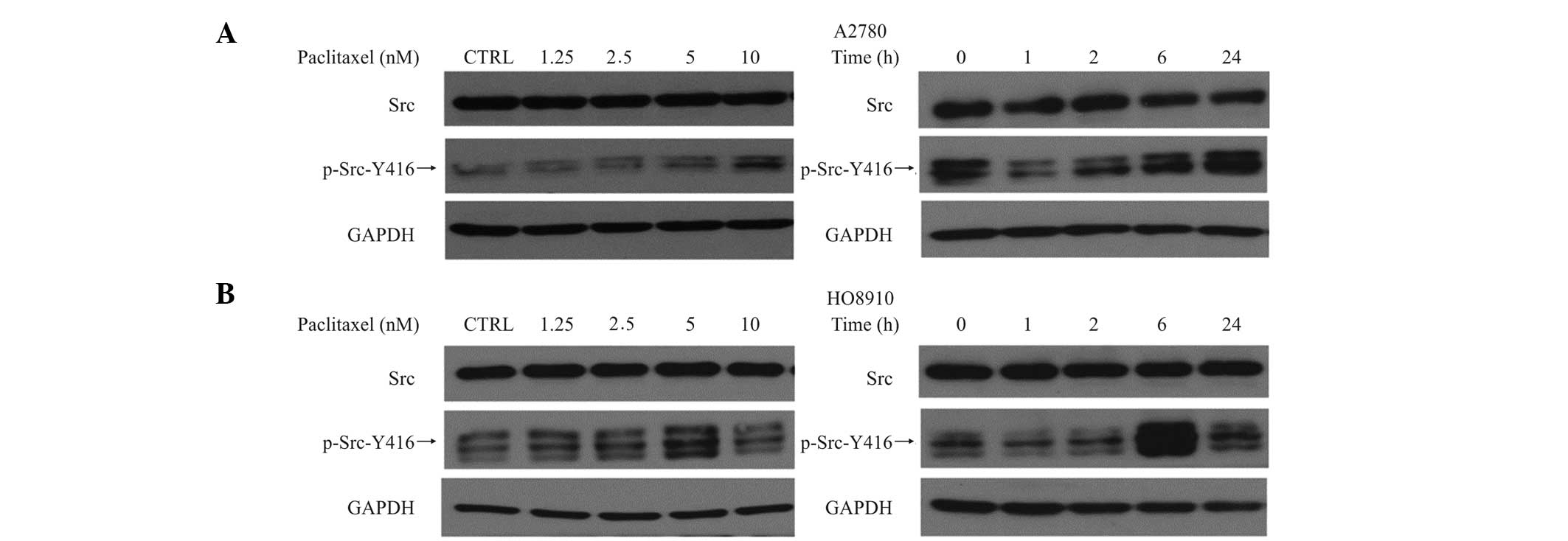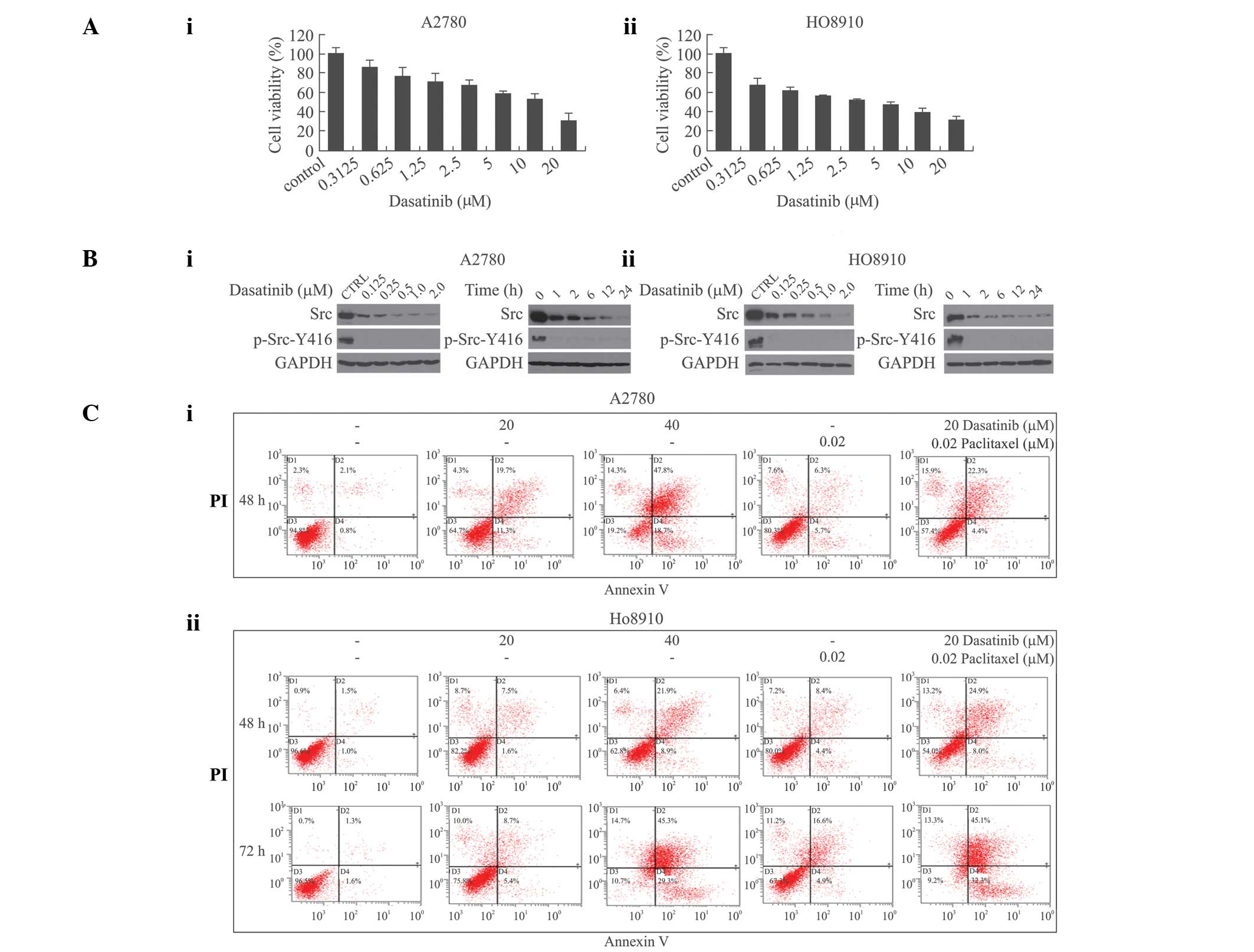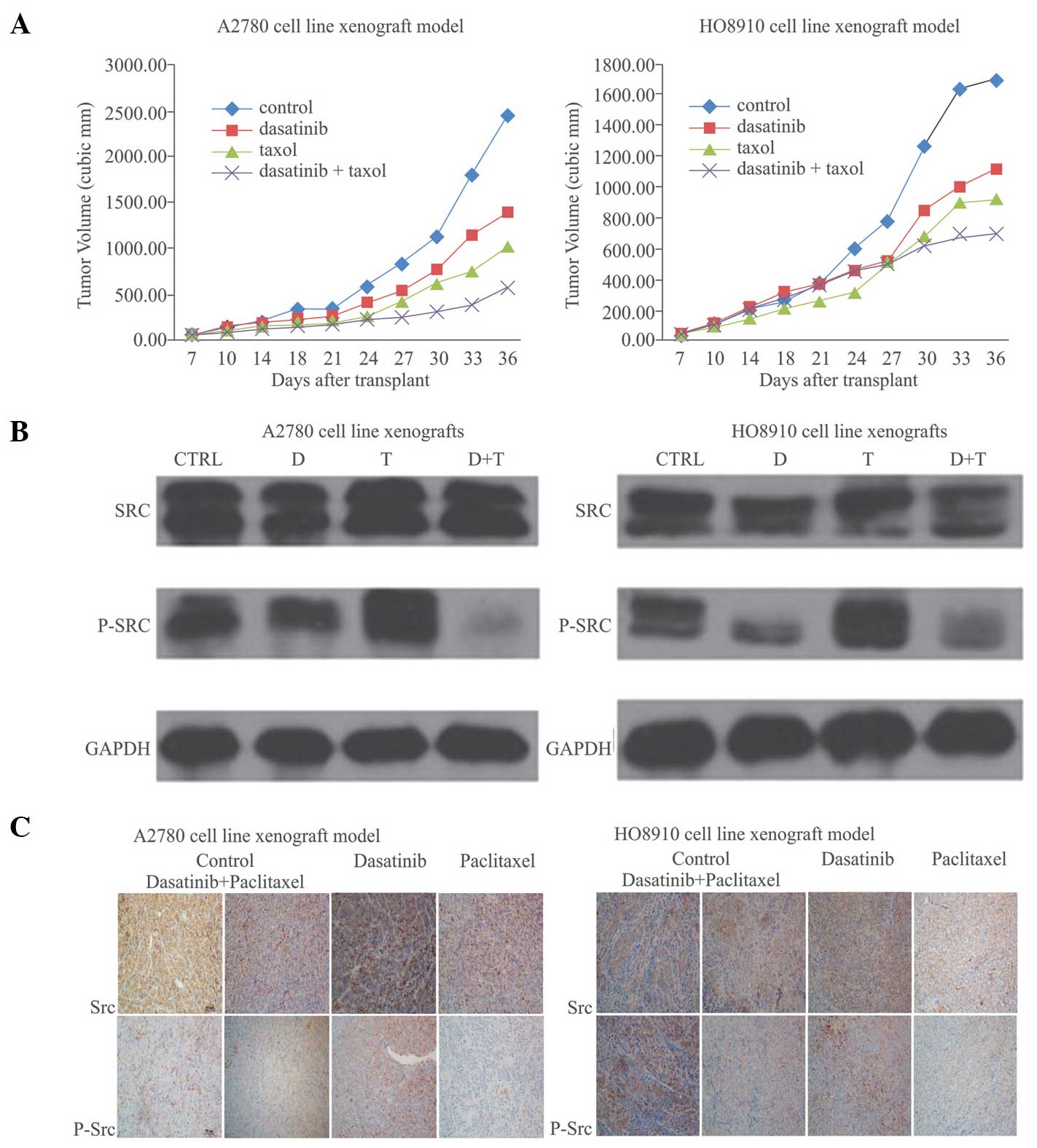|
1
|
Jelovac D and Armstrong DK: Recent
progress in the diagnosis and treatment of ovarian cancer. CA
Cancer J Clin. 61:183–203. 2011. View Article : Google Scholar : PubMed/NCBI
|
|
2
|
Siegel R, Naishadham D and Jemal A: Cancer
statistics, 2012. CA Cancer J Clin. 62:10–29. 2012. View Article : Google Scholar : PubMed/NCBI
|
|
3
|
Shah NP, Tran C, Lee FY, Chen P, Norris D
and Sawyers CL: Overriding imatinib resistance with a novel ABL
kinase inhibitor. Science. 305:399–401. 2004. View Article : Google Scholar : PubMed/NCBI
|
|
4
|
Yeatman TJ: A renaissance for SRC. Nat Rev
Cancer. 4:470–480. 2004. View
Article : Google Scholar : PubMed/NCBI
|
|
5
|
Brunton VG and Frame MC: Src and focal
adhesion kinase as therapeutic targets in cancer. Curr Opin
Pharmacol. 8:427–432. 2008. View Article : Google Scholar : PubMed/NCBI
|
|
6
|
Wheeler DL, Iida M and Dunn EF: The role
of Src in solid tumors. Oncologist. 14:667–678. 2009. View Article : Google Scholar : PubMed/NCBI
|
|
7
|
Summy JM and Gallick GE: Src family
kinases in tumor progression and metastasis. Cancer Metastasis Rev.
22:337–358. 2003. View Article : Google Scholar : PubMed/NCBI
|
|
8
|
Dehm SM and Bonham K: SRC gene expression
in human cancer: The role of transcriptional activation. Biochem
Cell Biol. 82:263–274. 2004. View
Article : Google Scholar : PubMed/NCBI
|
|
9
|
Morgan L, Nicholson RI and Hiscox S: SRC
as a therapeutic target in breast cancer. Endocr Metab Immune
Disord Drug Targets. 8:273–278. 2008. View Article : Google Scholar : PubMed/NCBI
|
|
10
|
Lutz MP, Esser IB, Flossmann-Kast BBM, et
al: Overexpression and activation of the tyrosine kinase Src in
human pancreatic carcinoma. Biochem Biophys Res Commun.
243:503–508. 1998. View Article : Google Scholar : PubMed/NCBI
|
|
11
|
Budde RJ, Ke S and Levin VA: Activity of
pp60c-src in 60 different cell lines derived from human tumors.
Cancer Biochem Biophys. 14:171–175. 1994.PubMed/NCBI
|
|
12
|
Wiener JR, Windham TC, Estrella VC, et al:
Activated SRC protein tyrosine kinase is overexpressed in
late-stage human ovarian cancers. Gynecol Oncol. 88:73–79. 2003.
View Article : Google Scholar
|
|
13
|
Huang YW, Chen C, Xu MM, Li JD, Xiao J and
Zhu XF: Expression of c-Src and phospho-Src in epithelial ovarian
carcinoma. Mol Cell Biochem. 376:73–79. 2013. View Article : Google Scholar : PubMed/NCBI
|
|
14
|
Lombardo LJ, Lee FY, Chen P, et al:
Discovery of N-(2- chloro- 6- methyl- phenyl)- 2-(6-(4-(2-
hydroxyethyl)-piperazin - 1- yl)- 2- methylpyrimidin- 4-
ylamino)thiazole- 5- carboxamide (BMS- 354825), a dual Src/Abl
kinase inhibitor with potent antitumor activity in preclinical
assays. J Med Chem. 47:6658–6661. 2004. View Article : Google Scholar : PubMed/NCBI
|
|
15
|
Gnoni A, Marech I, Silvestris N, Vacca A
and Lorusso V: Dasatinib: an anti-tumour agent via Src inhibition.
Curr Drug Targets. 12:563–578. 2011. View Article : Google Scholar : PubMed/NCBI
|
|
16
|
Nam S, Kim D, Cheng JQ, et al: Action of
the Src family kinase inhibitor, dasatinib (BMS-354825), on human
prostate cancer cells. Cancer Res. 65:9185–9189. 2005. View Article : Google Scholar : PubMed/NCBI
|
|
17
|
Johnson FM, Saigal B, Talpaz M and Donato
NJ: Dasatinib (BMS-354825) tyrosine kinase inhibitor suppresses
invasion and induces cell cycle arrest and apoptosis of head and
neck squamous cell carcinoma and non-small cell lung cancer cells.
Clin Cancer Res. 11:6924–6932. 2005. View Article : Google Scholar : PubMed/NCBI
|
|
18
|
Ceppi P, Papotti M, Monica V, et al:
Effects of Src kinase inhibition induced by dasatinib in non-small
cell lung cancer cell lines treated with cisplatin. Mol Cancer
Ther. 8:3066–3074. 2009. View Article : Google Scholar : PubMed/NCBI
|
|
19
|
Tsao AS, He D, Saigal B, et al: Inhibition
of c-Src expression and activation in malignant pleural
mesothelioma tissues leads to apoptosis, cell cycle arrest, and
decreased migration and invasion. Mol Cancer Ther. 6:1962–1972.
2007. View Article : Google Scholar : PubMed/NCBI
|
|
20
|
Trevino JG, Summy JM, Lesslie DP, et al:
Inhibition of SRC expression and activity inhibits tumor
progression and metastasis of human pancreatic adenocarcinoma cells
in an orthotopic nude mouse model. Am J Pathol. 168:962–972. 2006.
View Article : Google Scholar : PubMed/NCBI
|
|
21
|
Shor AC, Keschman EA, Lee FY, et al:
Dasatinib inhibits migration and invasion in diverse human sarcoma
cell lines and induces apoptosis in bone sarcoma cells dependent on
SRC kinase for survival. Cancer Res. 67:2800–2808. 2007. View Article : Google Scholar : PubMed/NCBI
|
|
22
|
Konecny GE, Glas R, Dering J, et al:
Activity of the multikinase inhibitor dasatinib against ovarian
cancer cells. Br J Cancer. 101:1699–1708. 2009. View Article : Google Scholar : PubMed/NCBI
|
|
23
|
Teoh D, Ayeni TA, Rubatt JM, Adams DJ,
Grace L and Starr MD: Dasatinib (BMS-35482) has synergistic
activity with paclitaxel and carboplatin in ovarian cancer cells.
Gynecol Oncol. 121:187–192. 2011. View Article : Google Scholar : PubMed/NCBI
|
|
24
|
Deng R, Tang J, Xia LP, et al: ExcisaninA,
a diterpenoid compound purified from Isodon MacrocalyxinD, induces
tumor cells apoptosis and suppresses tumor growth through
inhibition of PKB/AKT kinase activity and blockade of its signal
pathway. Mol Cancer Ther. 8:873–882. 2009. View Article : Google Scholar : PubMed/NCBI
|
|
25
|
Le XF, Mao W, Lu Z, Carter BZ and Bast RC
Jr: Dasatinib induces autophagic cell death in human ovarian
cancer. Cancer. 116:4980–4990. 2010. View Article : Google Scholar : PubMed/NCBI
|
|
26
|
Vitali R, Mancini C, Cesi V, et al:
Activity of tyrosine kinase inhibitor Dasatinib in neuroblastoma
cells in vitro and in orthotopic mouse model. Int J Cancer.
125:2547–2555. 2009. View Article : Google Scholar : PubMed/NCBI
|
|
27
|
Kim LC, Rix U and Haura EB: Dasatinib in
solid tumors. Expert Opin Investig Drugs. 19:415–425. 2010.
View Article : Google Scholar : PubMed/NCBI
|
|
28
|
Mayer EL and Krop IE: Advances in
targeting SRC in the treatment of breast cancer and other solid
malignancies. Clin Cancer Res. 16:3526–3532. 2010. View Article : Google Scholar : PubMed/NCBI
|
|
29
|
Yezhelyev MV, Koehl G, Guba M, et al:
Inhibition of SRC tyrosine kinase as treatment for human pancreatic
cancer growing orthotopically in nude mice. Clin Cancer Res.
10:8028–8036. 2004. View Article : Google Scholar : PubMed/NCBI
|
|
30
|
Le XF and Bast RC Jr: Src family kinases
and paclitaxel sensitivity. Cancer Biol Ther. 12:260–269. 2011.
View Article : Google Scholar : PubMed/NCBI
|
|
31
|
George JA, Chen T and Taylor CC: SRC
tyrosine kinase and multidrug resistance protein-1 inhibitions act
independently but cooperatively to restore paclitaxel sensitivity
to paclitaxel-resistant ovarian cancer cells. Cancer Res.
65:10381–10388. 2005. View Article : Google Scholar : PubMed/NCBI
|
|
32
|
Chen T, Pengetnze Y and Taylor CC: Src
inhibition enhances paclitaxel cytotoxicity in ovarian cancer cells
by caspase-9-independent activation of caspase-3. Mol Cancer Ther.
4:217–224. 2005.PubMed/NCBI
|
|
33
|
Agarwal R and Kaye SB: Ovarian cancer:
strategies for overcoming resistance to chemotherapy. Nat Rev
Cancer. 3:502–516. 2003. View Article : Google Scholar : PubMed/NCBI
|
|
34
|
Le XF, Mao W, He G, et al: The role of
p27(Kip1) in dasatinib-enhanced paclitaxel cytotoxicity in human
ovarian cancer cells. J Natl Cancer Inst. 103:1403–1422. 2011.
View Article : Google Scholar : PubMed/NCBI
|
|
35
|
Han LY, Landen CN, Trevino JG, et al:
Antiangiogenic and antitumor effects of SRC inhibition in ovarian
carcinoma. Cancer Res. 66:8633–8639. 2006. View Article : Google Scholar : PubMed/NCBI
|
|
36
|
Kim HS, Han HD, Armaiz-Pena GN, et al:
Functional roles of Src and Fgr in ovarian carcinoma. Clin Cancer
Res. 17:1713–1721. 2011. View Article : Google Scholar : PubMed/NCBI
|
|
37
|
Kopetz S, Lesslie DP, Dallas NA, et al:
Synergistic activity of the SRC family kinase inhibitor dasatinib
and oxaliplatin in colon carcinoma cells is mediated by oxidative
stress. Cancer Res. 69:3842–3849. 2009. View Article : Google Scholar : PubMed/NCBI
|


















